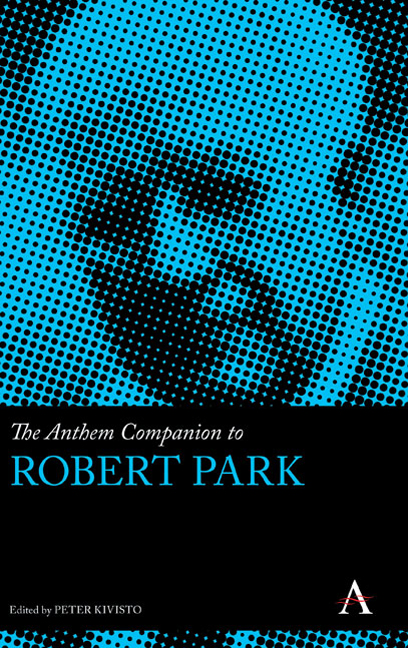Book contents
- Frontmatter
- Contents
- Introduction: The Legacy of Robert Ezra Park
- Chapter 1 A Twisted Path: Park, Gender and Praxis
- Chapter 2 Robert Park's Journey into Sociology
- Chapter 3 Beyond “Get the Seat of Your Pants Dirty in Real Research”: Park on Methods
- Chapter 4 The Basic Components of Social Action: Mead versus Park
- Chapter 5 Robert E. Park: Neglected Social Psychologist
- Chapter 6 Robert E. Park's Theory of Assimilation and Beyond
- Chapter 7 Robert Park's Marginal Man: The Career of a Concept in American Sociology
- Chapter 8 Marginality, Racial Politics and the Sociology of Knowledge: Robert Park and Critical Race Theory
- Chapter 9 The Cities of Robert Ezra Park: Toward a Periodization of His Conception of the Metropolis (1915–39)
- Chapter 10 The Impact of Robert E. Park on American Sociology of Religion
- Chronology
- Contributors
- Index
Chapter 3 - Beyond “Get the Seat of Your Pants Dirty in Real Research”: Park on Methods
Published online by Cambridge University Press: 10 January 2018
- Frontmatter
- Contents
- Introduction: The Legacy of Robert Ezra Park
- Chapter 1 A Twisted Path: Park, Gender and Praxis
- Chapter 2 Robert Park's Journey into Sociology
- Chapter 3 Beyond “Get the Seat of Your Pants Dirty in Real Research”: Park on Methods
- Chapter 4 The Basic Components of Social Action: Mead versus Park
- Chapter 5 Robert E. Park: Neglected Social Psychologist
- Chapter 6 Robert E. Park's Theory of Assimilation and Beyond
- Chapter 7 Robert Park's Marginal Man: The Career of a Concept in American Sociology
- Chapter 8 Marginality, Racial Politics and the Sociology of Knowledge: Robert Park and Critical Race Theory
- Chapter 9 The Cities of Robert Ezra Park: Toward a Periodization of His Conception of the Metropolis (1915–39)
- Chapter 10 The Impact of Robert E. Park on American Sociology of Religion
- Chronology
- Contributors
- Index
Summary
After exploring the provenance of Park's famous “get the seat of your pants dirty in real research” quotation, this chapter goes on to look at some of his, usually ignored, programmatic statements about the conduct of research. Examined in this way are the influence of W. I. Thomas on Park's methodological thinking, Park's work on the Pacific Race Relations Survey, his views on quantification, and the relationship between interviewing and the life history within the Chicago tradition.
One of the most celebrated quotations in sociology is attributed to Robert Park:
You have been told to go grubbing in the library, thereby accumulating a mass of notes and a liberal coating of grime. You have been told to choose problems wherever you can find musty stacks of routine records based on trivial schedules prepared by tired bureaucrats and filled out by reluctant applicants for aid or fussy do- gooders or indifferent clerks. This is called “getting your hands dirty in real research.” Those who counsel you are wise and honourable; the reasons they offer are of great value. But one more thing is needful: first- hand observation. Go and sit in the lounges of the luxury hotels and on the doorsteps of the flophouses; sit on the Gold Coast settees and on the slum shakedowns; sit in the Orchestra Hall and in the Star and Garter Burlesk. In short, gentlemen, go get the seat of your pants dirty in real research.
It was one of Park's students, the then 29- year old graduate student Howard Becker (not to be confused with the later Howard S. Becker), who preserved this statement. Today, the source for Park's words is usually given as John McKinney's 1966 book Constructive Typology and Social Theory. Using the quotation as evidence of the empiricist concerns of Chicago sociologists, McKinney described it as an “Unpublished statement made by Robert E. Park and recorded by Howard Becker while a graduate student at Chicago in the twenties” (1966, 71). In fact, the quotation had previously appeared in a chapter published by Becker in 1954 in a book edited by John Gillin that seems for the most part to have lain unnoticed and uncited.
- Type
- Chapter
- Information
- The Anthem Companion to Robert Park , pp. 51 - 74Publisher: Anthem PressPrint publication year: 2017

